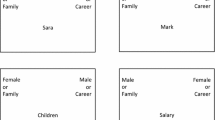Abstract
To test the selective recall hypothesis, male and female adolescents listened to a tape recording of 30 “findings” about sex differences. Fifteen of the findings were pro-female and 15 were anti-female. After being given free recall and then cued recall tests, the subjects completed the British version of the attitudes towards women scale. Multiple regression analysis supported the prediction that males, and those with more negative attitudes to wards women, recalled less pro- and more anti-female items, and vice versa. The importance of selective recall to studies of social cognition is discussed.
Similar content being viewed by others
References
Alper, T., & Korchin, S. Memory for socially relevant material. Journal of Abnormal and Social Psychology 1952, 47 25–39.
Bem, S. Gender schema theory: A cognitive account of sex typing. Psychological Review 1981, 88 354–364.
Cantor, N., & Kihlstrom, J. (Eds.). Personality, cognition and social interaction Hillsday, New Jersey: Lawrence Erlbaum, 1981.
Carlsson, M., & Jaderquist, P. Note on sex-role opinions as conceptual schemata. British Journal of Social Psychology 1983, 22, 65–68.
Clark, K. Some factors influencing the remembering of prose material. Archives of Psychology 1940, 35. (No. 253)
Fiske, S., Kinder, O., & Larter, W. The novice and the expert: knowledge-based strategies in political cognition. Journal of Experimental Social Psychology 1983, 19 381–400.
Forgas, J. (Ed.). Social cognition: Perspective on everyday understanding. London: Academic Press, 1981.
Furnham, A. Responses bias, social desirability and dissimulation. Personality and Differences 1986, 7 385–400.
Garcia, L., & Griffitt, W. Evaluation and recall of evidence: Authoritarianism and the Patty Hearst case. Journal of Research in Personality 1978, 12 57–67.
Greenwald, A. Cognitive learning, cognitive response to persuasion, and attitude change. In A. Greenwald, T. Brock, & T. Ostrom, (Eds.), Psychological foundation of attitudes. New York: Academic Press, 1968.
Halpern, D. The influence of sex-role stereotypes on prose recall. Sex Roles 1985, 12 363–375.
Hastorf, A., & Isen, A. Cognitive social psychology New York: North Holland, 1982.
Hepburn, C. Memory for the frequency of sex-typed versus neutral behaviors: Implications for the maintenance of sex stereotypes. Sex Roles 1985, 12 771–776.
Jones, E., & Kohler, R. The effect of plausibility on the learning of controversial statements. Journal of Abnormal and Social Psychology 1958, 53 315–320.
Levine, J., & Murphy, G. The learning and forgetting of controversal material. Journal of Abnormal and Social Psychology 1943, 38 507–517.
Markus, H. Self-schema and processing information about the self. Journal of Personality and Social Psychology 1977, 35 63–78.
Martin, C. & Halverson, C. A schematic model of sex-typing and stereotyping in children. Child Development 1981, 52 1119–1134.
Mills, C. (1983). Sex-typing and self-schemata effects on memory and response latency. Journal of Personality and Social Psychology 1983, 45 163–172.
Parry, G. A British version of the Attitudes Toward Women Scale. British Journal of Social Psychology 1983, 22 261–263.
Roberts, J. Public opinion and capital punishment: The effects of attitudes upon memory. Canadian Journal of Criminology 1984, 26 283–291.
Signorella, M., & Liben, L. Recall and reconstruction of gender-related pictures: Effects of attitude, task difficulty and age. Child Development 1984, 55 393–405.
Taft, R. Selective recall and memory distortion of favourable and unfavourable material. Journal of Abnormal and Social Psychology 1954, 49 23–28.
Taylor, S., & Voss, J. Attitudes and knowledge effects in prose processing. Journal of Verbal Learning and Verbal Behaviour 1982, 21 524–538.
Waly, P., & Cook, S. Attitude as determinant of learning and memory: A failure to confirm. Journal of Personality and Social Psychology 1966, 4 280–288.
Watson, W., & Hartmann, G. The rigidity of basic attitudinal frame. Journal of Abnormal and Social Psychology 1939, 34 314–335.
Zillig, M. Einstelling und Aussage. Zietscrift fur Psychologie 1928, 106 58–106.
Author information
Authors and Affiliations
Rights and permissions
About this article
Cite this article
Furnham, A., Singh, A. Memory for information about sex differences. Sex Roles 15, 479–486 (1986). https://doi.org/10.1007/BF00288225
Issue Date:
DOI: https://doi.org/10.1007/BF00288225




